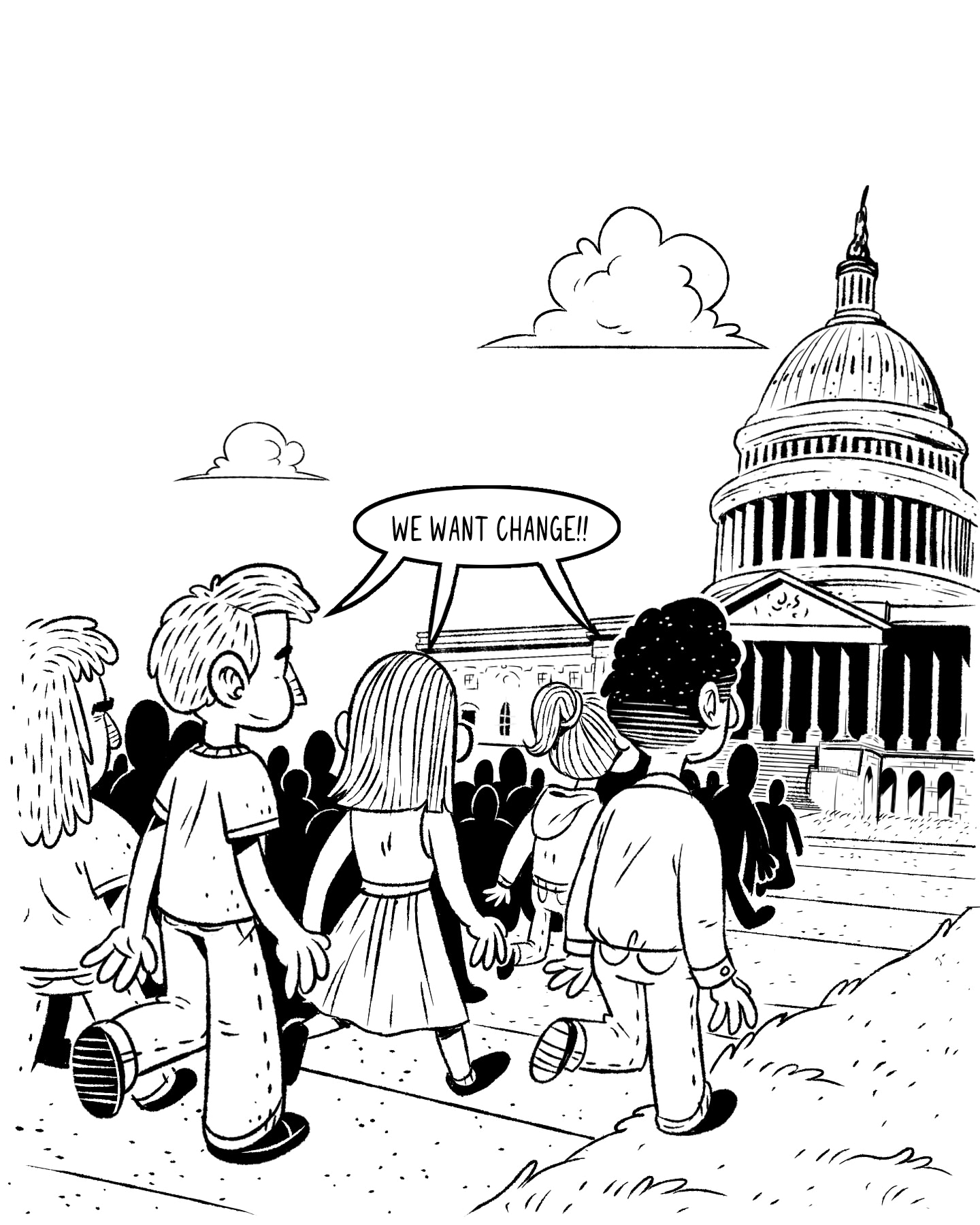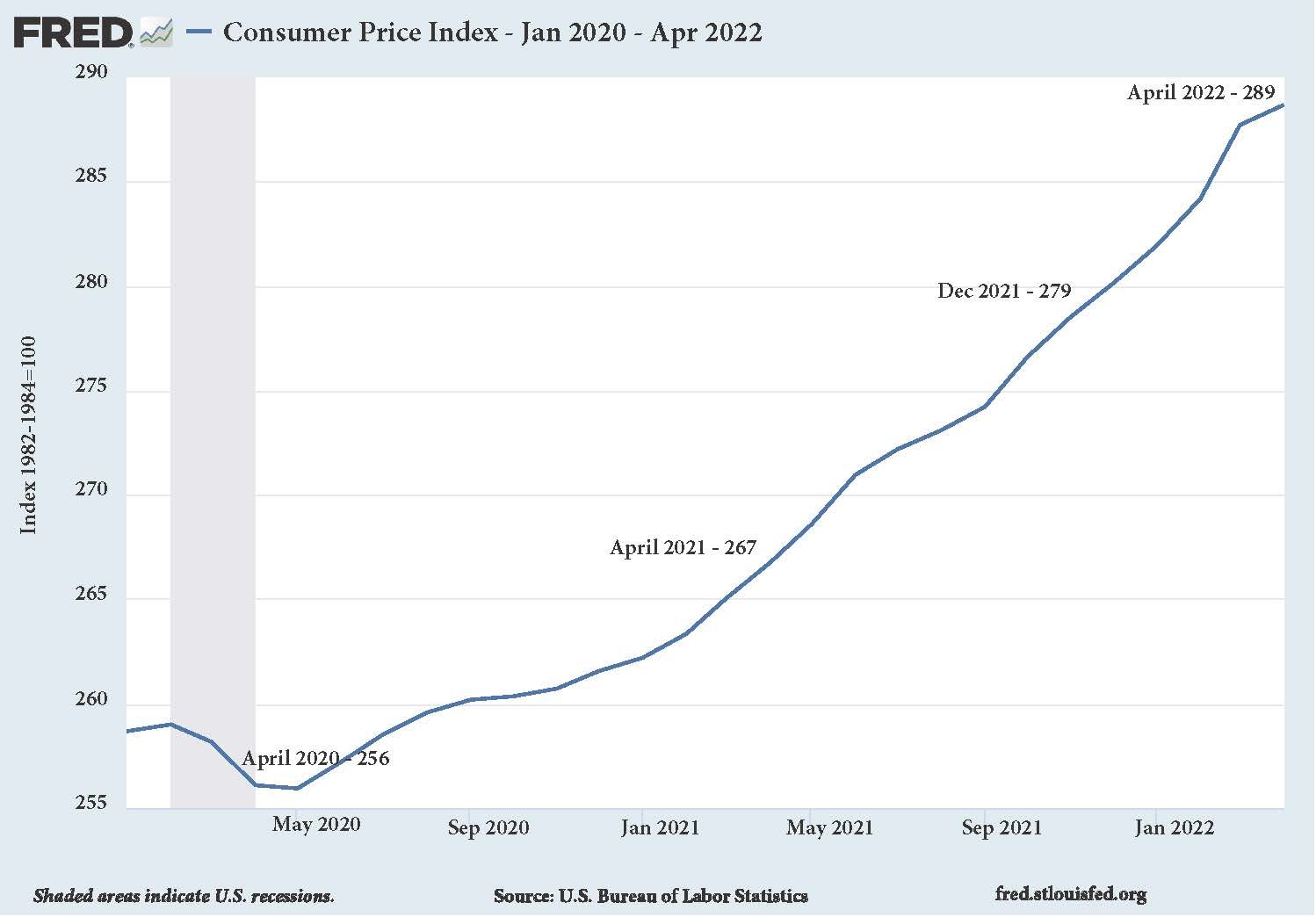Fed Chair Powell Asked for Inflation and Now He Owns It
May 30, 2022 – In March 2020, Federal Reserve Chairman Jerome Powell (Fed Chair Powell) was concerned that Inflation was not hitting the target of 2%, but falling further. Well, his wish finally came true. Inflation in April 2022 was at 8.3% (Fig.1), the highest in the last 40 years and well above the Fed’s target. However, the Federal Reserve with J. Powell as its chairman, continued to print money and kept interest rates (Fed Funds) to almost zero. The Federal Reserve (Fed) serves as the central bank of the United States and is an independent government agency. For over a year, some Economists have been saying that the Fed is behind the curve, implying that it has been late in raising interest rates to curb inflation.
The Federal Reserve (Fed) is following the same playbook as other political entities in Washington DC. The playbook is very simple: First, to deny that there is a crisis, then acknowledge its existence once it is obvious. This follows up with the narrative that the crisis is temporary and everything is under control. Finally, there is the reaction to fix the crisis once it becomes acute and there is no way of denying its severity. Reaction starts slowly, drip by drip, hoping that the crisis will be contained. When it is too late to control the crisis then they react aggressively and take a victory lap once it is contained. read more…
The MI Generation

January 30, 2021 – The MI generation constitutes the largest and most powerful voting bloc in the United States. Through its voting and economic power, it can transform American laws and corporate policies by engaging in the political process and public deliberations. Best of all, this process is free. The MI generation’s political and economic power will continue to grow as it becomes a larger segment of society as consumers and voters. However, the MI Generation is presented with the numerous challenges, such as student debt, climate change, inequality, and a divided nation. A nation that is governed by elected officials who seem to be interested in keeping their jobs than DOING their job. Their response and inability to lead the nation during the Covid-19 pandemic suggests that their priority is self-preservation and tribal loyalty than saving innocent American lives. At the same time, they are using the MI Generation as an automated teller machine (ATM) to fulfill their appetites for unchecked federal spending without any plans to pay for it.
The MI Generation can be defined as those born between 1980 and 2018 and are 51% of the population. It makes up 42% (ninety-eight million) of the voting population, large enough to be a decisive factor in any election. The MI Generation includes millennials and subsequent generation known as Generation Z. There is no precise date that defines millennials or Generation Z. However, Americans born between 1980 and 1995 are considered millennials, and those born after 1995 till 2012 are generally known as members of the i-Generation, iGens, or Generation Z. They have witnessed Covid-19 and the deaths of over 400,000 innocent Americans in 2020, dot-com bubble, the housing and financial crisis, two wars, and a divided nation, all within their short life span. With that backdrop they will have a consequential impact on national politics and corporate America for rest of the twenty-first century. read more…
Confessions of an Old Man
How Millennials are Being Robbed
Confessions of an Old Man is about how next generation is being robbed of their future and what can they do about it. The goal of the book is to get Millennials angry enough to actively engage with the American political system and take control of their destiny instead of their future being decided by rich old white men. It is a statement of collective guilt that places the responsibility on my generation, the baby boomers, for dealing a bad card to their children and grandchildren. My generation controls the Congress, the Supreme Court, and the presidency, so we cannot shirk from the responsibility.
This book starts by defining the MI generation and characterizing its economic and political power in decades to come. It then provides an analysis of adverse impact of student loans, national debt, health-care cost, global warming, and retirement on future generations. The book concludes with a challenge and a road map of a better future for all Americans.
Kirkus Reviews
“An inspiring, provocative encouragement to younger generations to exercise political clout….the author supplies a surprisingly sober analysis–one that’s consistently reasonable and pragmatic….this is an intelligent call for practical reform….A spirited critique of American politicians’ treatment of younger generations, and a plan of action for youth empowerment.”
San Francisco Book Review
“Exploring the ways that the baby boomer generation has robbed millennials of future economic stability, Moon uses in-depth research to quickly establish himself as an authority on the subject…. Anyone who is interested in learning a little more about economics, government, the environment, and the implications of the so-called “American Dream” is sure to enjoy Moon’s Confessions of an Old Man.”
Manhattan Book Review
“I recommend this book to all who desire imminent change, but I deem it a must-read for Millennials. …In his confession, this old man is guaranteed to convince the reader that serious issues can be conquered by working the democratic process–but the people must act.”
Introducing Author Munir Moon
Munir Moon is a former financial industry executive, a successful small business owner and an author of three books. Moon spent eight years in the financial industry, starting at Chase Econometrics and ending at a savings and loan association during the 1980s. He was a firsthand observer of the financial crisis in the 1980s, which resulted in the demise of the savings and loan industry, to be repeated in 2008 in a different form. Having a son born with cancer who survived numerous surgeries, he has experienced the best and worst of American healthcare system. As a businessman, he appreciates the impact of over-regulations, taxes and globalization.







